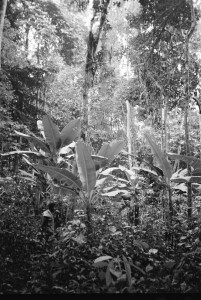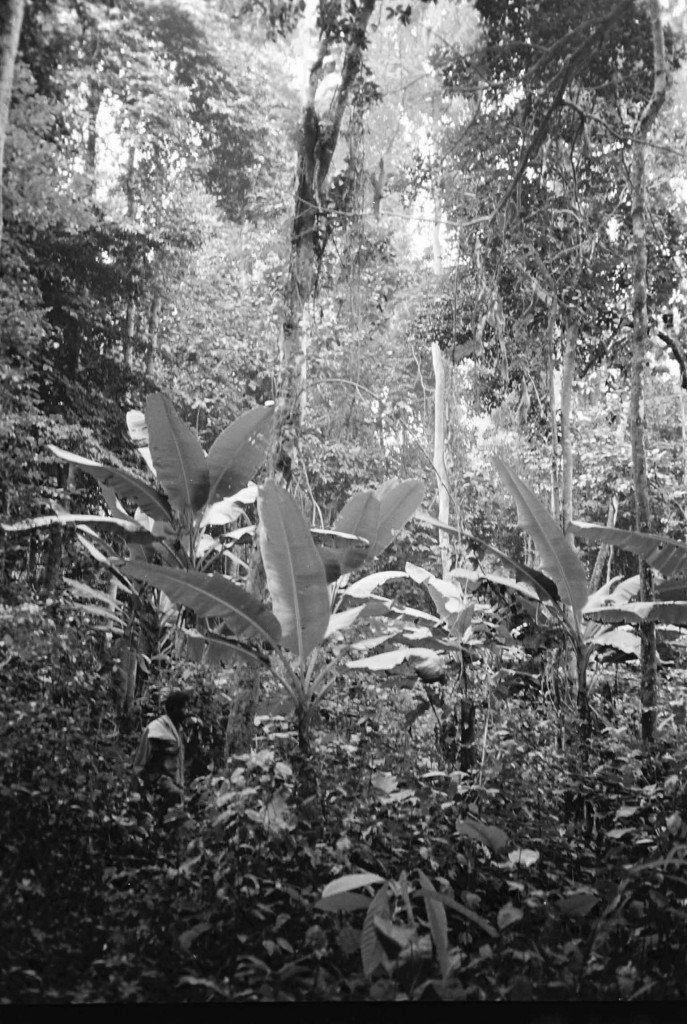Pauline von Hellermann seeks the root causes of African deforestation in Things Fall Apart? The Political Ecology of Forest Governance in Southern Nigeria, published in September. The volume stems from Hellermann’s ethnographic and historic research within the tropical forest of Nigeria’s Edo State as she digs to uncover the failings of forest protection. The following is an excerpt from the Introduction.
____________________________________________

To international foresters and conservationists, there are clear links between recent management failure and deforestation in Nigeria. The Conservation Atlas of Tropical Forests, for example, states that Nigeria’s ‘natural forests were carefully managed in the early part of the century, [but] they have since been severely over-exploited’ (Lowe, et al. 1992: 230; see also Oates 1999). Nigerians themselves routinely blame corruption and greed amongst foresters and politicians for forest loss and the depletion of timber. Such accounts fit smoothly into the broader perception of Nigerian governments as corrupt and inefficient; into the constant refrain that ‘things fall apart’ in Nigeria.
But they are also symptomatic of a wider trend in the understanding of deforestation in Africa. For much of the 20th century the main perpetrators in deforestation were seen to be small scale farmers recklessly cutting down trees, either unaware of the environmental consequences of their actions or forced by economic necessity (e.g. Cleaver 1992). In recent decades, however, a critical body of research has shown that rural populations often actively improve rather than destroy their environments, and that the persistence of their negative perception presents a powerful environmental ‘crisis narrative’ that has been instrumental in justifying colonial and post-colonial land appropriation in the name of conservation (Fairhead and Leach 1996; Leach and Mearns 1996; Roe 1995; Spichiger and Blanc-Pamard 1973; Wood 1993). Instead, in Africa and elsewhere focus has shifted to the ‘underlying’, political causes of tropical deforestation (Contreras-Hermosila 2000; Geist and Lambin 2002).
This shift reflects in part the emergence of political ecology and its concern with the intersection of political economy and environmental change. Initially such political ecology work, such as Blaikie and Brookfield’s seminal Land Degradation and Society (1987), was still primarily concerned with poor small scale farmers, albeit highlighting how their practices were determined by larger political and economic processes beyond their control. But recently it has increasingly paid attention to deforestation caused by larger scale agricultural projects, industrial logging and the various political processes behind this, such as Hecht and Cockburns (1990) work in Amazonia, Klopp’s (2000) study of elite land grabbing in Kenya, or Dauvergne’s (1993) analysis of deforestation in Indonesia (see also Dove 1993; Rudel 2007).
At the same time, the shift reflects the rise of the ‘good governance’ agenda in international development since the 1990s. In the context of growing difficulties with the implementation of Structural Adjustment Programs (SAPs), major donors and international financial institutions such as the World Bank and IMF increasingly identified ‘bad governance’ – inefficiency, corruption, weak legal systems and policing, lack of transparency and accountability – as root causes of SAPs implementation problems, and indeed of underdevelopment and poverty, and began to make lending conditional on the promotion of ‘good governance’ – efficiency, rule of law, transparency, accountability and participation. Consequently, the forestry sector has become increasingly concerned with the combat of corruption and in particular illegal logging, which have been identified as key causes of deforestation in recent years (e.g. Barbier, et al. 2005; Glastra 1999; Kishor and Damania 2007; Laurance 2004; Palmer 2001; Siebert and Elwert 2002).
Corruption, mismanagement and the non-implementation of official policies indeed often play a critical role in tropical deforestation, and need to be analysed and understood properly. Doing so not only helps to shift the blame for deforestation away from small scale farmers, it also addresses a weakness in the existing critique of environmental crisis narratives. This literature readily acknowledges that policy processes are far from smooth and have many unintended outcomes (e.g. Fairhead and Leach 2003; Keeley and Scoones 2003; Leach and Mearns 1996). But because it focuses on exposing the continuities in conservation discourses and policies that deny farmers access to resource use, it pays less attention to actual policy practices and to the reasons behind the discrepancies between stated and actual practices. It is important to engage seriously with these discrepancies, in order to understand the actual outcomes of forest policies for both local livelihoods and landscapes.

However, in identifying corruption and governance failures as key causes of deforestation, and politicians and civil servants as its main agents, it is all too easy to be influenced by another set of crisis narratives, namely political ones. Political crisis narratives are in many ways just as pervasive, and instrumentalised just as effectively, as environmental ones. Accounts of corruption and mismanagement have, for example, played a key role in justifying the stringent SAPs of the 1980s and 1990s and good governance conditionalities since then (Harrison 2006; Szeftel 1998). They also play an important role in the internal politics of many developing countries. This is certainly the case in Nigeria, where political crisis narratives abound. Almost daily, its newspapers feature articles entitled ‘The problem with Nigeria’, ‘What’s wrong with Nigeria’, or ‘Things fall apart’, and in everyday conversations many Nigerians discuss their political leaders and administrators in nothing but the most disparaging terms, with a constant circulation of tales of corruption, abuses of power and crime. Scholarship on Nigerian politics, too, tends to concentrate largely on how they are shaped by patron-client relations, corruption, graft, violence and predation (Eberlein 2006; Joseph 1983; Lewis 1996; Reno 2002). Overall perceptions are reflected in titles such as The Crippled Giant (Osaghae 1998), This House Has Fallen (Maier 2000), or The Criminalisation of the African State (Bayart, et al. 1999), in which Nigeria features prominently.
Whilst there is much basis for such analyses, it is also the case that accusations of corruption and crime have long been used as political tools in Nigeria (Tignor 1993); they are themselves deeply engrained in Nigerian political culture and therefore cannot necessarily be taken at face value. Moreover, the entrenched, automatic evocation of corruption and government failure as the main causes of today’s problems prevents more careful, nuanced analyses. This is the case with Edo State forestry, where deforestation is so routinely associated with recent mismanagement and corruption that there seems little need to investigate the current state of affairs further. Yet important as recent management failures are in explaining the state of Edo forestry and forests, this analysis does not tell the whole story: there is more to recent developments than simply the collapse of a once properly functioning system of management.
___________________________________________
Pauline von Hellermann is Lecturer in Anthropology at Goldsmiths, University of London. She has conducted research on landscapes and politics in Nigeria and Tanzania and is editor of Multisited Ethnography: Problems and Possibilities in the Translocation of Research Methods (with Simon Coleman, Routledge, 2011).
Volume 18 of Environmental Anthropology and Ethnobiology

